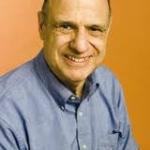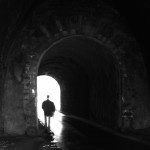You've said that one of your concerns is that the book will be read and presented as a historical reflection on religion and pop culture, when it is really about deep metaphysical issues and religious questions as these are addressed through pop culture. Can you say more about the claims that your authors and artists (and you through them) are making about the nature of consciousness, the imagination, the paranormal and the nature of time?
Sure. I sum these up in the book in two phrases: the Human as Two and Time as Two. By the Human as Two, I refer to the common experience of my authors and artists that they are two: a finite, socially constructed, temporal social ego; and an infinite, spaceless, timeless Mind. This claim in turn implies the other, namely, that Time is Two. There is the tick-tock, linear flow of ordinary time; and there is the Presence or Now of eternity, of a form of consciousness that is not in space-time and so is not born, does not die, and is—to use the traditional theological expressions—immortal and divine. My authors return again and again to this doctrine not as a piece of speculation, but as a living, direct experience. They do not "think" this. They know this.
In terms of my approach to the imagination, I am very much in line with my colleague Jess Hollenback on this one. Usually, the human imagination is a producer of fantasies, a dreamer, a daydreamer. But sometimes, sometimes, it is infused or "empowered" by weird metaphysical energies. In these moments of influx, the human imagination is no longer a projector but a kind of "translator" or "mediator" of Mind, which communicates, which probably can only communicate, to the social ego through symbol and myth. Here the fantasy is also the fact. The trick is the truth.
Let's rewrite the subtitle. What other pithy phrases sum up this book?
The original subtitle was "The Secret Life of a Superpower." I was trying to get at the idea here that American culture possesses a kind of hidden life, a secret story, and that this secret life revolves around the category of the paranormal. Let's just face it: America is a paranormal culture.
From a pop culture perspective, what do you think of a show like Fringe, whose central themes are parallel universes, paranormal experiences, and psychic powers?
I don't watch Fringe, I'm afraid, but I've seen plenty of similar material on television and in film. I mean, how does one watch all of these things? There are literally dozens of such series at any point in time. But this in itself is significant. My suspicion here is that these tropes are so successful and so omnipresent because people are tired of being told that they are just biological robots, that they are nothing but matter, that there is no meaning anywhere. They know this is a half-truth, and they turn to science fiction because it looks like science, but it is really religion in disguise. It is not really about science. It is really about the soul. Which is what people are most hungry to hear about.
Do you think there is a relationship between psychedelic drug use and religious experience? Could we ever consider that kind of drug use to be a "religious" or "spiritual" practice?
It's a definite pattern in this history, for sure. You know, I write about this very question at length in Esalen via Aldous Huxley, who thought about this question deeply and concluded that psychedelic substances do not "cause" mystical experiences but rather catalyze them by suppressing brain function. The brain for Huxley is primarily a filter of reality and what he called Mind at Large. The brain does not "produce" consciousness. It filters, reduces, mediates, or translates Mind at Large into social, cultural, linguistic, and neurological frameworks. Mess with or suppress or traumatize that filter and a whole lot of reality, a whole lot of Mind at Large pours in, translated, of course, by the human imagination and all that conditioned, socially determined brain matter. I agree with Huxley. In some cases, not all of course, profound religious experiences can be catalyzed by drugs, just as they can also be catalyzed by other forms of trauma: car wrecks, illness, death, life crisis, sexual experience, you name it. There are many ways to traumatize the brain-filter and get beyond the ego. There are many ways to crack the cosmic egg and allow Mind at Large to pour in.
Name one person you hope reads this book. Why?
Jack Kirby. Kirby was the artist who co-created with Stan Lee so much of the Marvel Universe. He's one of my heroes. He would get this book. He would love this book. But Jack is dead.
Maybe Steven Spielberg, then. Why? My secret hope is that authors, artists, and filmmakers of all types will do something with these ideas, create new culture, create new visions of what we can be. Our contemporary stories of who we are are so pathetically small and parochial. We need new stories, soul-sized stories, as I put it in the Conclusion of the book.




